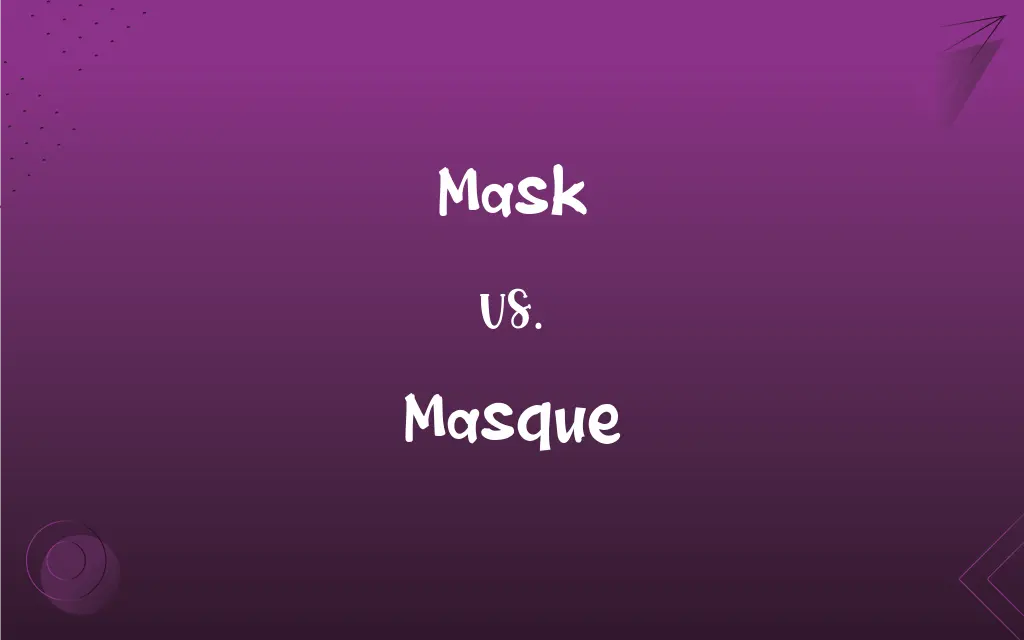Mask vs. Masque: What's the Difference?
Edited by Aimie Carlson || By Janet White || Published on July 16, 2024
A mask is a covering for the face used for protection, disguise, or entertainment, while a masque is a type of elaborate theatrical entertainment involving music, dancing, and costumes, popular in the 16th and 17th centuries.

Key Differences
A mask serves various functions, such as concealing identity, providing protection, or serving as a part of a costume. It is a physical object that can be worn over the face. On the other hand, a masque is a form of entertainment that combines drama, music, dance, and elaborate staging, often associated with royal courts or aristocratic events in the Renaissance period. While masks can be a component of a masque, as performers might wear them, the term "masque" refers to the theatrical performance itself, not the wearable object.
Masks are used worldwide in cultural, religious, and festive events, as well as for practical purposes in healthcare and safety. They can be made from various materials, including paper, fabric, and plastic. Masques, historically, were luxurious performances that symbolized the power and wealth of the nobility, featuring elaborate costumes and scenery, and often conveyed political or moral themes through allegorical content.
The significance of masks extends beyond their physical utility; they hold symbolic meanings in many cultures, representing spirits, ancestors, or mythical beings. Masques, while no longer a common form of entertainment, have influenced modern theater and opera with their emphasis on spectacle and the blending of various art forms.
In contemporary contexts, the term "mask" is frequently associated with health and safety, especially noted during global health crises. Masques, although primarily of historical interest, are studied for their cultural and artistic significance, offering insight into the social and political life of earlier times.
Comparison Chart
Definition
A covering for the face
A form of theatrical entertainment
ADVERTISEMENT
Purpose
Protection, disguise, entertainment
Artistic performance combining music, dance, and drama
Material/Form
Made from paper, fabric, plastic, etc.
An event or show, not a physical object
Historical Context
Used across cultures for millennia
Popular in the 16th and 17th centuries, especially in Europe
Relation
Can be part of costumes in many settings
Includes masks as part of the performers' costumes
Mask and Masque Definitions
Mask
A covering for all or part of the face.
She wore a mask to the masquerade ball.
ADVERTISEMENT
Masque
A theatrical performance combining various arts.
The masque featured elaborate costumes and scenic designs.
Mask
An object worn on the face for disguise.
The robber disguised himself with a ski mask.
Masque
A genre of Renaissance drama characterized by allegory.
The playwright composed a masque symbolizing the virtues of the king.
Mask
A representation of a face used as a decorative element.
The museum displayed an ancient mask from Egypt.
Masque
A form of aristocratic entertainment of music and dancing.
The court attended a lavish masque at the palace.
Mask
A protective covering worn over the face.
Doctors wear a surgical mask during operations.
Masque
An event showcasing poetry, music, and dance.
The festival concluded with a historical masque reenactment.
Mask
A facial treatment applied for cosmetic benefits.
She applied a clay mask to cleanse her pores.
Masque
A spectacle involving masked performers.
The masque included a procession of characters from mythology.
Mask
A covering, as of cloth, that has openings for the eyes, entirely or partly conceals the face, and is worn especially at a masquerade ball.
Masque
A dramatic entertainment, usually performed by masked players representing mythological or allegorical figures, that was popular in England in the 1500s and early 1600s.
Mask
A grotesque or comical representation of a face, worn especially to frighten or amuse, as at Halloween.
Masque
A dramatic verse composition written for such an entertainment.
FAQs
Can masks be part of a masque?
Yes, performers in a masque often wear masks as part of their costumes.
What materials are masks made from?
Masks can be made from paper, fabric, plastic, and other materials.
What is a mask?
A covering for the face used for various purposes including protection and disguise.
Do masques still take place?
While not common, masque-like performances can be found in opera and ballet.
What is the significance of masks in festivals?
Masks are central to many festivals, representing cultural and spiritual beliefs.
What is a masque?
An elaborate theatrical entertainment popular in the 16th and 17th centuries.
Are masks still used today?
Yes, masks are widely used for health, safety, and entertainment purposes.
How do masks and masques differ in purpose?
Masks are for individual use; masques are collective theatrical performances.
How have masks impacted culture?
Masks hold significant cultural, religious, and symbolic meanings worldwide.
Are masks used in modern theater?
Yes, masks are used in theater for character portrayal and symbolic purposes.
What themes did masques typically address?
Masques often conveyed allegorical themes celebrating royal or noble virtues.
How do masks protect against health risks?
Masks can filter out harmful particles, preventing disease transmission.
Can anyone wear a mask?
Masks are generally accessible to anyone for various needs and purposes.
How do masks contribute to art?
Masks are used in art for their expressive potential and cultural significance.
What distinguishes masques from other theatrical forms?
Masques uniquely blend music, dance, and drama with elaborate staging and costumes.
How did masques influence modern entertainment?
Masques influenced the development of opera, ballet, and elaborate stage productions.
What kind of music was featured in masques?
Masques featured early forms of classical music, often composed by notable musicians.
Who attended masques historically?
Masques were mainly attended by royalty, nobility, and invited guests.
What role did masques play in history?
Masques were important in showcasing the wealth and power of the aristocracy.
Were masques exclusive to Europe?
While most famous in Europe, similar forms of entertainment existed globally.
About Author
Written by
Janet WhiteJanet White has been an esteemed writer and blogger for Difference Wiki. Holding a Master's degree in Science and Medical Journalism from the prestigious Boston University, she has consistently demonstrated her expertise and passion for her field. When she's not immersed in her work, Janet relishes her time exercising, delving into a good book, and cherishing moments with friends and family.
Edited by
Aimie CarlsonAimie Carlson, holding a master's degree in English literature, is a fervent English language enthusiast. She lends her writing talents to Difference Wiki, a prominent website that specializes in comparisons, offering readers insightful analyses that both captivate and inform.






































































